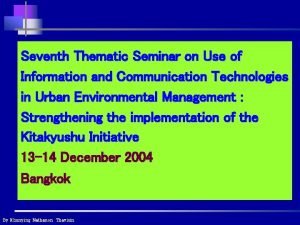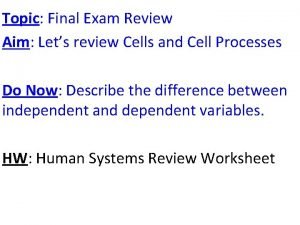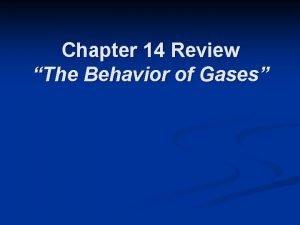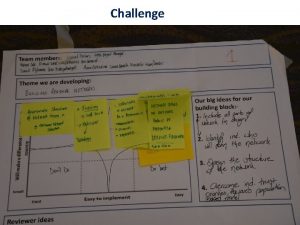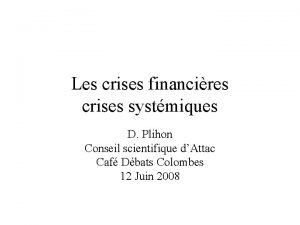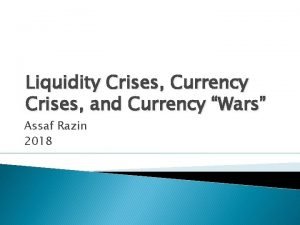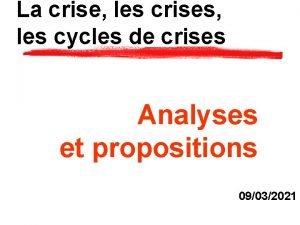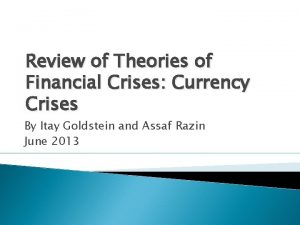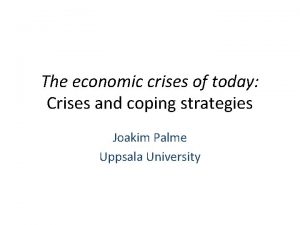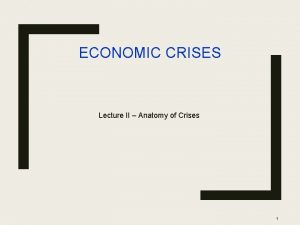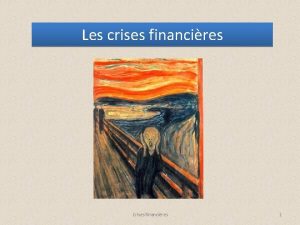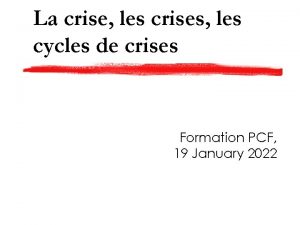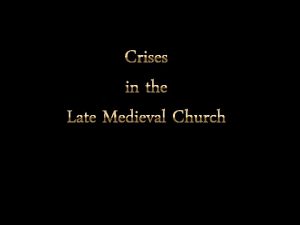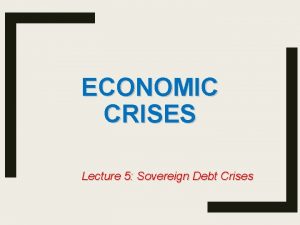The Challenge of Managing Crises in a Rapidly


















- Slides: 18

The Challenge of Managing Crises in a Rapidly Changing World Dr. Stephen F. Lintner Senior Technical Advisor, World Bank and President Elect, International Association for Impact Assessment (IAIA) XI International Health Impact Assessment Conference Granada, Spain April 2011

World Bank Group • Founded 1944 • Over 185 Countries as Members Represented by a Board of Executive Directors • Headquarters in Washington, DC • An Extensive Network of Offices Throughout the World • Includes: – International Bank for Reconstruction and Development (IBRD) – International Development Association (IDA) – International Finance Corporation (IFC) – Multilateral Investment Guarantee Agency (MIGA)

World Bank • Focus on Poverty Reduction, including the Millennium Development Goals • Commitment to Environmentally and Socially Sustainable Development, supporting outcome of Rio and Johannesburg Summits • Addressing Climate Change – both Mitigation and Adaptation – as a Development Issue Uses an Interdisciplinary Approach in Providing Support for Policies, Plans, Programs, Projects and Capacity Building

World Bank • Since 1989 the World Bank has had a Board Approved Policy on Environmental Assessment – Including Project Related Health Impacts • Making Extensive Use of Strategic Assessments at Multiple Levels • Process for Updating and Consolidation of Policies in Process – Will Broaden Range of Instruments – Including Specific Reference to Health Impact Assessment as an Option

The Challenge of Managing Crises in a Rapidly Changing World • Facing a threefold global crisis: – Economic – Food – Climate. • Need to understand: – Vital importance of inter-linkages among them – Identify missed opportunities in putting these pieces together – Undertaking complementary proactive and preventive measures

Health Sector Fiscal Year 2011 Approved and Planned Health Sector Support: US $ 3. 1 Billion • Child Health • Communicable and Non-Communicable Diseases Health System Performance • Human Development • Nutrition and Food Security • HIV/AIDS Malaria • Tuberculosis Complemented by National and Thematic Studies

Protecting Pro-Poor Health Services During Financial Crisis • Poor nutrition and lower level use of health care when needed • Women, children, poor and informal sector workers are most at risk • A special risk exists in many low-income countries in maintaining access to essential health commodities that are often imported

Protecting Pro-Poor Health Services During Financial Crisis • Real spending per capacity can decline due to reduced revenues, currency devaluation and potential reductions in aid flows • Low-income Countries with weak fiscal policies are most vulnerable • Minimize adverse impact on health outcomes and health expenditures

Protecting Pro-Poor Health Services During Financial Crisis • Broad strategies that maintain overall levels of Government spending on health tend not be successful, failing to protect access to quality health services especially for the poor • Targeted demand-side approaches like conditional cash transfers may be more effective broader approaches • Import to make effective use of social safety net programs which include support for nutrition and health •

Cost of Environmental Degradation • 2000 -2010: Cost of Environmental Degradation (COED) in Algeria, Egypt, Iran, Jordan, Lebanon, Morocco, Syria and Tunisia • Estimates the annual COED in selected countries (% of the countries’ GDP) • Summarizes their impacts at national and regional levels • Training manual in French, Arabic, English

Overview: Six Categories • Agricultural Land - Agricultural productivity on croplands and rangelands • Forests - Wood, grazing, watershed protection, biodiversity • Water - Systemic impacts of water salinity, contamination, sedimentation, groundwater overexploitation • Air Quality - Systemic impacts of air pollution on health and environment • Waste - Impacts of inappropriate waste collection on the environment and public welfare • Coastal Zone - Losses of recreational and landscape value due to unsustainable coastal activities

COED Can Vary Substantially … 8 7. 4 7 Coastal zone Air 4 3 2 1 Waste 4. 8 5 2. 1 3. 4 3. 5 3. 7 Land 2. 4 Water Iran Egypt Morocco Algeria Lebanon (conflict) Lebanon Syria Jordan 0 Tunisia % of GDP 6 12

Tunisia - Cost of water degradation = 0. 6% of GDP 100% 90% % of the total cost 80% 70% 60% 50% Health (18%) Tourism (18%) Groundwater (21%) 40% 30% 20% 10% Agriculture (33%) 0% 1. 2% in Morocco, 2. 8% in Iran

Impact on Investments Algeria • First Economic Recovery Program included institutional reforms and pilot investments in the environment sector for 2001 -2004 (US$450 million) Egypt • Second Pollution Abatement project to reduce pollution from energy and industrial sectors (US$198 million) Morocco: • First Water Sector Development Policy Loan (US$100 million) • Solid Waste Sector Development Policy Loan (US$132 million) • Investments in pollution control in the Sebou basin (US$25 million)

Three Major Themes • Integration • Innovation • Implementation Importance of Addressing Both Major New Challenges and Continuing Challenges

Information on World Bank Group Environmental and Social Safeguard Policies • Safeguards Website www. worldbank. org/safeguards • Use of Country Systems Website www. worldbank. org/countrysystems • Strategic Environmental Assessment (SEA) Tool Kit Website www. worldbank. org/seatoolkit • IFC’s Sustainability Policy Framework www. ifc. org • Environmental Health and Safety www. ifc. org/ifcext/enviro. nsf/context/Environmental. Guidelines

International Association for Impact Assessment (IAIA) • Annual Meeting – “Impact Assessment and Responsible Development for Infrastructure, Business and Industry” – Puebla, Mexico (May 28 – June 6, 2011) • Special Symposium on SEA Implementation and Practice: Making a Difference? – Prague, Czech Republic (September 21 -23, 2011) • Special Symposium on Climate Change and Impact Assessment – Beijing, China (proposed for December 2011) Contact: www. iaia. org

Contact Dr. Stephen F. Lintner Senior Technical Advisor World Bank 1818 H Street, NW Washington, DC 20433 USA E-Mail: slintner@worldbank. org
 The crises
The crises Mouse meervoud
Mouse meervoud Teen challenge nottingham
Teen challenge nottingham Chapter 15:4 observing standard precautions
Chapter 15:4 observing standard precautions To gently combine two mixtures
To gently combine two mixtures Active phagocytes that increase rapidly acute infection
Active phagocytes that increase rapidly acute infection While viewing a slide of rapidly moving sperm cells
While viewing a slide of rapidly moving sperm cells Which of the following gases will effuse the most rapidly
Which of the following gases will effuse the most rapidly To cook by the vapor produced from boiling water
To cook by the vapor produced from boiling water Which compounds solubility decreases most rapidly
Which compounds solubility decreases most rapidly Talk rapidly
Talk rapidly Conceptual physical science 5th edition
Conceptual physical science 5th edition Extracapillary
Extracapillary Which rock weathers most rapidly when exposed to acid rain?
Which rock weathers most rapidly when exposed to acid rain? Compound sentence formulas
Compound sentence formulas Corporations developed rapidly in the 1830s
Corporations developed rapidly in the 1830s Plyometrics involves moving a weight as rapidly as possible
Plyometrics involves moving a weight as rapidly as possible Số nguyên tố là
Số nguyên tố là đặc điểm cơ thể của người tối cổ
đặc điểm cơ thể của người tối cổ
